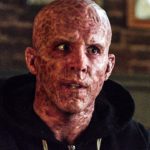Real-life is not black and white and our stories shouldn’t be either. An antihero lives in the grey area between hero and villain which gives your book depth and conflict when well crafted. To be able to write these characters well, we need to understand their components, why they are compelling, and examine them cast in various roles.
Affiliate Links: In the example section I have some Amazon Associate’s links to the original material. These links will give us a small commission at no added cost to you if you decide to buy anything which helps keep our lights on.
Also, I have not seen Deadpool 2 nor read the Watchmen graphic novel, so if you wanted to use the links to sponsor a copy, I could use them for… research. 😜

Definition of an Antihero
As the term suggests, an antihero is “not a hero,” but they are not villains either. Just like real life, good characters are complicated so we should clearly define what an antihero is.
One Part Hero
An antihero is a character that improves the lives of those around them in some way. They take a stand for what is right or seek out justice on behalf of those who cannot. A traditional hero uplifts the weak and is a shining role model. A good antihero has the heart of a traditional hero and you love them for it.
One Part Villain
What distinguishes them from a dyed-in-the-wool hero is they exhibit terrible character flaws normally found in villains. A hero will save a hijacked school bus by apprehending the bad guy and turning them over to the police. An antihero will save them by throwing the bad guy out of the bus into traffic while doing 80 miles per hour on the interstate, all in full view of the children. An antihero will lie, cheat, steal, or even murder if it is for the greater good. The actions and methods of an antihero are deplorable and you hate them for it.
Why We Love an Antihero
A good antihero is much like a fine cheese: It wouldn’t be as enjoyable if it didn’t have that powerful stink to it. Our love for stinky cheese remains a mystery to me, but I do have some insight into why we love our funk-riddled heroes.
Flawed
An antihero means well, but they’re not perfect. Their good intentions are constantly at war with the dark side of them which creates a constant conflict, either within them or within us as we watch them. This inner conflict is layered over the external conflict that drives the story forward creating a compelling layer cake of tension. The traditional hero versus villain structure has to work much harder to generate the same effect.
Complex
With a traditional story, there is a good guy and a bad guy. The good guy wins and life is perfect. This dynamic isn’t realistic though. Life is messy where actions have consequences, sometimes bad ones. Sometimes we have to choose the lesser of two evils or make a hard choice for the greater good. An antihero lives in the same world we do which makes the story more believable. We touched on the fourth wall in Methods of Character Design and a good antihero helps reinforce it.

We Can Relate
A hero is fun because it shows us what we want to be. We want to be honorable, powerful, honest, and usually good looking. An antihero shows us what we are or would be in a similar circumstance. They mean well and eventually get the job done, but mistakes are made along the way.
Many good antiheroes are also unattractive, further distancing themselves from traditional heroes. We all have that one thing about ourselves that would be different in a perfect world. An antihero is awesome because of their flaws and they show us that we are too.
Passion Evoking
Huge industries centered around sports are commonplace in our society because they stoke our passions into a blazing inferno. Watch a one-sided (American) football game with no long passes or breakout runs and you’ll also see a placid audience. The second someone drops the ball or throws a 30-yard pass, the crowd explodes!
A traditional hero and villain act out the one-sided game, where an antihero frequently makes terrible decisions to make us scream followed by huge wins to make us cheer. We get to ride on a wonderfully, twisty emotional rollercoaster that leaves us with a delightful sense of vertigo.
Infamous Antiheroes
Much like villains, an antihero is best understood when seen in action so I have assembled a small roster to examine.
Deadpool

You may remember this character from How to Write Great Villains, but today we’re not talking about the X-Men Origins version. We’re looking at the one from Deapool (2016) and Deadpool 2 (2018), also known as “the good version.” In these movies, the “merc with the mouth” gives us a textbook look at an antihero. He frequently uses vulgar language, horribly murders people, and goes out of his way to harass an old blind woman. He is also physically disfigured which is brutally touched on several times in hilarious detail.
“You look like an avocado had sex with an older, more disgusting avocado, not gently… There was something wrong with the relationship and that was the only catharsis that they could find without violence.”
Weasel
Despite his shortcomings, which are legion, Wade Wilson (Deadpool) is clearly the good guy in his story. I’m not going to spoil any plot points here, but the context of how he acquired his powers and his core motivation throughout the film makes his actions understandable.

Dexter Morgan
Another good antihero comes from the hit TV show Dexter that premiered on Showtime. For those of you who are not familiar, Dexter Morgan works as a blood-spatter analyst to solve murder cases. Clearly a good guy. Oh, he’s also a serial killer. Clearly a bad guy. He only kills other serial killers though. At this point nothing is clear. Unlike Wade Wilson, it’s difficult to tell who the actual “good guy” is in this story, but that makes it all the more exciting to watch.
The Comedian
This one comes to us from the film Watchmen (2009) which was based on the graphic novel with the same name. What is interesting about this one is the debate behind the nature of the character in question. The Comedian is a “hero” that routinely does terrible things for the sole purpose of doing terrible things. On the surface, he is a villain that associates himself with other masked heroes.

I have heard it argued that he does said terrible things to point out the hypocrisy of vigilantes breaking the law to enforce it. In the film, he also refuses to finish a task that is too horrible for even him to do.
None of his true motivations are spelled out, leaving his character in a grey area of hypotheticals and theory. Whether the Comedian is a hero, villain or antihero is largely debatable, which is why I chose to include him in the roster. His lack of definition by the author and filmmakers gives him a depth that has makes me wonder endlessly about him.
Philip J. Fry

The animated TV show Futurama brings us an antihero that demonstrates an antihero doesn’t have to be all murder and mayhem. The antihero in question is none other than Fry, although any of the main characters fits the bill. Fry is a pizza delivery guy from the 20th century that gets transported 1,000 years into the future. He spends his time exploring the magical advancements of the future that those around him take for granted and pursuing his love interest with boyish enthusiasm. He’s also a certifiable idiot.
Despite the plot of the season or episode, he is driven by his love, compassion, and a sense of adventure, but these aspects get overwhelmed by his youthful selfishness or idiocy from time to time. He demonstrates over and over that he is a good guy, he just falls victim to himself sometimes.
Wrap Up
If you want to write a story that is gritty and feels real, a good antihero may be a good fit for your story. The complexity, tragic flaws, and lack of clarity that comes with them will naturally draw your readers into your story while the added layers of conflict keep them coming back for more when they put the book down. Look to the antihero to let your story have its head in the clouds while keeping one foot planted firmly on the ground.
This week’s book report:
Words Written (Week 4): 2,759 out of 2,500 (Back on the right side of the word count!)
Words Left: 19,559
Last Three Words Written: Marr had escaped. (You get a juicy one this week!)




Great going on your word count this week! You make a good point that a story with just a hero and a villain can quickly become unrealistic, predictable and boring. Nothing like a good antihero to spice things up and give us someone to relate to.
Thanks for the cheers on the word count. I know you read quite a bit, so I’m curious to know: Do you have a personal favorite antihero?
I think that would have to be Jack Reacher in the books written by Lee Child. Really violent but it is always the bad guys that get hurt. I typically don’t like violent books or movies, but for some reason I really like these. I have read them all.
That is a really good one! I never really saw Jack Reacher as an antihero, but now that you mention it he fits the bill rather well.
Pingback: The Hero: A Beacon of Hope - Merchants of the Void